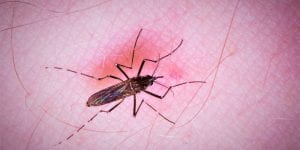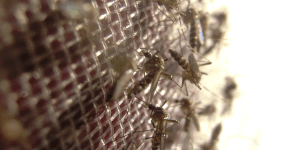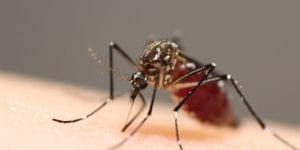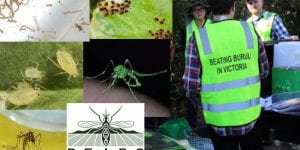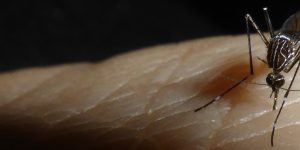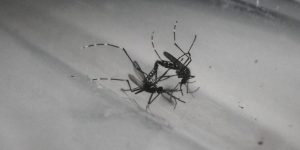Tag: mosquitoes
-
Sampling by the sea – collecting mosquitoes in the Mornington Peninsula
Words and images: Véronique Paris It’s 7.30 Saturday morning – what are your plans for the day? While you may be still in bed contemplating a coffee, or still sound asleep, I’m packing the PEARG ute with a stack of small buckets, strips of red felt, some rabbit food, and a 20lt jerrycan of water. […] -
Establishment of Wolbachia Strain wAlbB in Malaysian Populations of Aedes aegypti for Dengue Control
Our freshly published open access paper in Current Biology is the culmination of several years of work with a large team of very talented and dedicated researchers. Rather than rehash the story here, please see press releases below: Press release from the UniMelb newsroom (alternatively at Bio21’s siteBio21’s site or at SciMex) Brief summary article […] -
Lab-reared mosquitoes maintain their lust for blood
Words and images: Perran Ross Modified mosquitoes raised in laboratories are being released into the wild in disease control programs. These mosquitoes will still bite you, but they’re less capable of transmitting the viruses that cause dengue fever, Zika and more. This antiviral effect is caused by infection with a bacterium called Wolbachia, which occurs […]blogs.unimelb.edu.au/pearg/2019/11/07/lab-reared-mosquitoes-maintain-their-lust-for-blood
-
Releases of Wolbachia-infected mosquitoes for disease control
Words and images: Perran Ross When animals raised in captivity are released back into the wild, you might picture cute and furry mammals from an endangered species. But in many countries around the world, people are releasing mosquitoes raised in laboratories into the environment. These mosquitoes feed on human blood and are vectors of dengue, […]blogs.unimelb.edu.au/pearg/2019/09/18/releases-of-wolbachia-infected-mosquitoes-for-disease-control
-
Using bacteria to control mosquitoes Dr Tom Schmidt and Professor Ary Hoffmann “This article was first published on Pursuit. Read the original article.” Living inside the cells of insects is a type of bacteria that is looking increasingly like the key to controlling the spread of dengue fever, the Zika virus and other mosquito-borne diseases. […]
-
MSc projects 2020 – Students wanted
We are seeking motivated MSc students to apply for several projects starting next year. Enquiries via pearg-queries@unimelb.edu.au Project 1/4: Exploring bacterial symbionts for agricultural pest control PEARG is researching ways to control important agricultural pests such as aphids and mites that cause millions of dollars in damage to crops each year in Australia. This project […]blogs.unimelb.edu.au/pearg/2019/06/14/msc-projects-2020-students-wanted
-
Marking mosquitoes
Words: Mengjia Liu Images: Perran Ross and Mengjia Liu It is important to study the fitness of different colonies of Wolbachia-infected mosquitoes, and also of interest to test fitness effects within the same colony when mosquitoes are maintained under different conditions. As we have been maintaining uninfected mosquitoes under laboratory conditions for over 25 generations, […] -
SEEKING MSc STUDENT | Buruli Ulcer’s Most Wanted – Understanding the mosquito associated with the flesh-eating bacteria, Mycobacterium ulcerans
Aedes notoscriptus has been identified in association with the emerging bacterial pathogen Mycobacterium ulcerans, which causes Buruli ulcer, as well as being a vector of Ross River virus. Key ecological features such as bloodmeal feeding patterns and movement dynamics of individuals are however not clearly defined. This project will involve both laboratory and field-based components. Field […] -
Probing the void for blood
Words and video: Perran Ross I recently filmed one of our mosquito colonies trying desperately to reach my arm through their enclosure. The video has been posted on Reddit by a third party and received enormous attention with over 4.5 million views in its first nine hours. To make the video, I held my arm […]blogs.unimelb.edu.au/pearg/2018/07/10/probing-the-void-for-blood
-
Large male mosquitoes unluckier in love
Words and images: Perran Ross Large male mosquitoes may have more trouble than smaller males in finding a partner. In a new study, we find that small female mosquitoes tend to avoid larger males, preferring to mate with smaller ones. In this study, now available as a pre-print on bioRxiv, we performed laboratory experiments to […]blogs.unimelb.edu.au/pearg/2018/05/31/large-male-mosquitoes-unluckier-in-love
Number of posts found: 38

